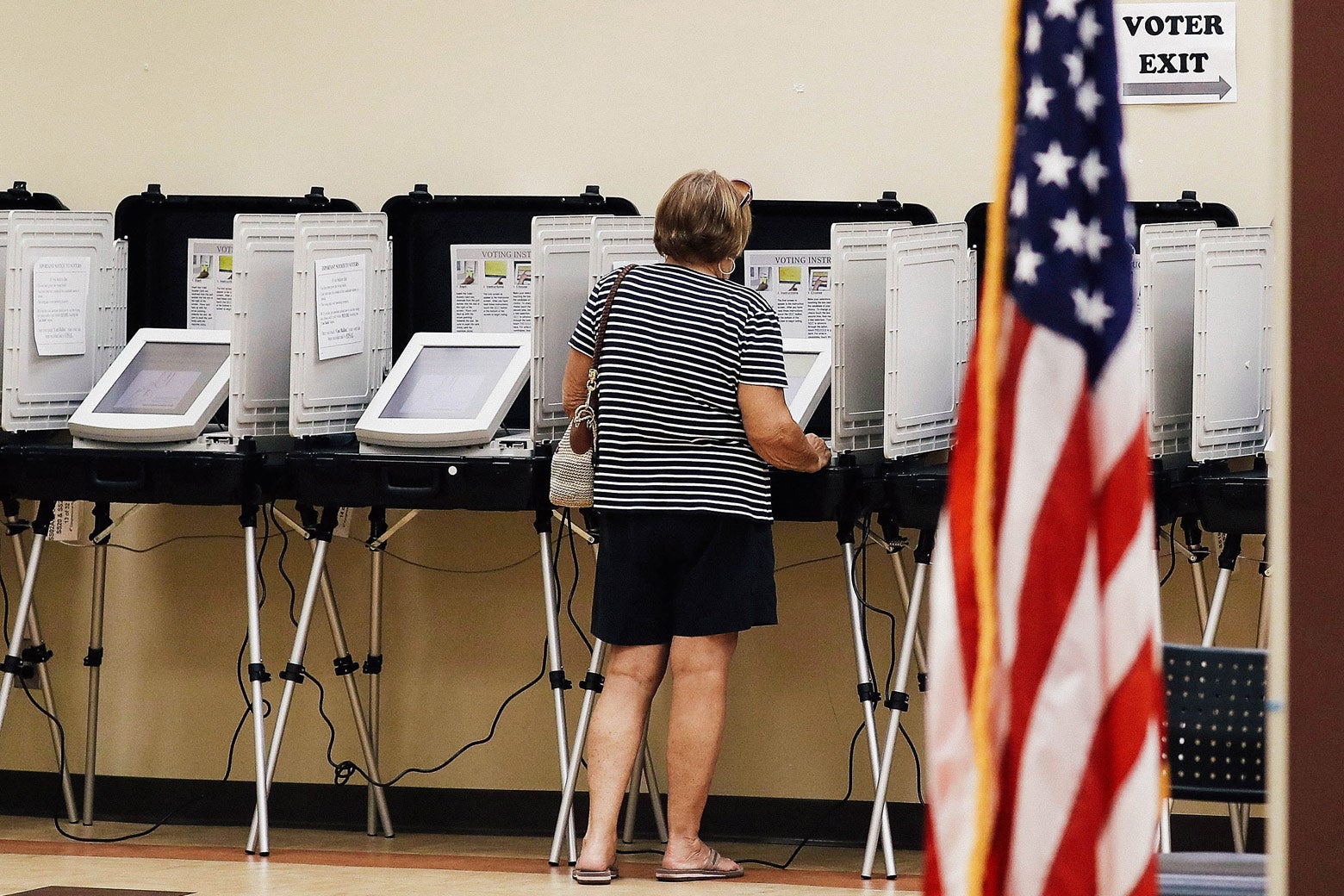Say you live in Georgia. You’re eager to vote in this year’s election—a tight race between Democrat Stacey Abrams and Republican Trump acolyte Brian Kemp—so you fill out an absentee ballot and mail it in. Then, days or weeks after the election, you receive a notice in the mail. The signature on your absentee ballot, it explains, looked different from the signature on your voter-registration card. So an election official threw out your ballot. There is nothing you can do. Your vote has been voided.
If Georgia’s signature-mismatch law remains in effect through the November election, this fate will befall thousands of would-be voters. The statute directs elections officials to apply amateur handwriting analysis to voters’ signatures and reject any potential “mismatch.” Nearly 600 ballots and ballot applications have already been rejected for mismatch, a disproportionate number of them cast by minority voters. Now the American Civil Liberties Union of Georgia is suing, demanding that the state give all citizens an opportunity to cure ballots rejected for mismatch. Its suit will help determine how successfully Georgia will suppress minority votes in the upcoming race.
Signature-mismatch laws are a scourge of American elections. The very premise makes no sense: In a similar lawsuit filed in New Hampshire, a forensic document examiner testified that effective signature comparison requires 10 signature samples “at a minimum” to account for variability. Even then, experts may struggle to verify a signature, because our signatures often change over time. Voters who are disabled or elderly, or are nonnative English speakers, are especially likely to have variation between signatures. That’s one reason why New Hampshire’s mismatch law disproportionately impacted seniors, California’s disproportionately impacts first-generation Asian Americans, and Florida’s disproportionately impacts Hispanics.
But there’s likely something more insidious going on here too. The extreme racial disparities among those affected by mismatch laws may also reflect the broad discretion that election officials have to toss ballots. In states with stringent mismatch rules, a handful of election officials are frequently responsible for the vast majority of ballots voided for mismatch. And those officials routinely work in counties with large minority communities.
That’s the case in Georgia. The epicenter of the current mismatch crisis is Gwinnett County, the most diverse county in the state. While Gwinnett has just 12 percent of the state’s total mail-in ballots, it’s already responsible for 40 percent of statewide rejections this election cycle. Voters who cast absentee ballots very early may receive their rejection letters before Election Day, which allows them to try again by voting in person. But there is no requirement that the state send these letters speedily, so many receive them far too late. And even worse, there is no procedure by which a voter can cure her ballot—by, say, verifying her identity to an election official. If she wants to cast a ballot that counts, she must start from the beginning. And if the election is over, she has no ability to exercise her right to vote.
The ACLU argues that this scheme violates due process. It’s well established that qualified voters have a liberty interest in casting a ballot that counts, and so the government must provide some process before depriving citizens of that right. Georgia grants them none. Under long-standing Supreme Court precedent, courts must decide “what process is due” by weighing the interests at stake, the risk of violating those interests, the value of additional safeguards, and the burdens they will impose on the government.
Here, all these factors weigh heavily in the ACLU’s favor. The interest at stake is monumental—the fundamental right to vote. And the risk of Georgia infringing upon that interest is astonishingly high: The state does not even require election workers to learn rudimentary handwriting analysis, leaving the job to the whims of untrained (and potentially politically motivated) county officials. They may use their limitless discretion to nullify ballots, and victims have no chance of redress.
To remedy this constitutional flaw, the ACLU has urged a federal district court to impose a backstop for voters whose ballots are voided for mismatch. Sean J. Young, legal director of the ACLU of Georgia, told me on Thursday that “we aren’t insisting on some hyper-elaborate formal proceeding.” Rather, “We’re asking that voters be able to resolve the discrepancy by emailing or mailing extrinsic evidence to confirm that they’re the same person,” like similar signatures on other documents. A voter should also be able to send over a copy of her ID, Young said, or even chat with officials on the phone to verify her identity. A federal district court ordered these kinds of backstops in New Hampshire, and the state has had no trouble implementing them.
Sounds reasonable enough, right? The problem is that Georgia Secretary of State Brian Kemp—the same guy running for governor—is a ruthless voter suppressor who is already keeping 53,000 voters, mostly minorities, off the rolls. Kemp is an expert at deploying legally dubious maneuvers to disenfranchise minorities, and he has gone all out for this election. He will surely fight any lower-court decision injecting some fairness into the signature-mismatch mess, since his own shot at the governor’s office is on the line.
The situation is a distressing but helpful reminder that signature-mismatch laws are useless at best and dangerous at worst. In the hands of a maestro vote thief like Kemp, they can be deployed to quash votes for your opponent. But even in the hands of well-meaning but hapless election officials, mismatch rules are anathema to equal suffrage. The ACLU’s proposed safeguards are an excellent way to reform them, but they really need to be abolished altogether. There is no rational defense of signature-mismatch laws—unless you’re a politician trying to swing an election.
